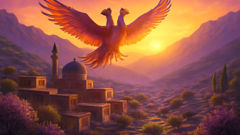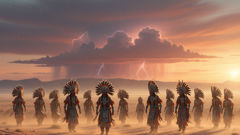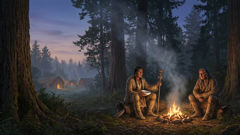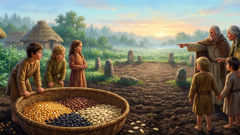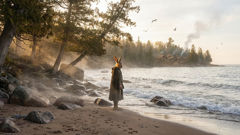Introduction
In the heart of the ancient Persian plateau, where mountains stretch towards sapphire skies and lush valleys cradle the dreams of countless generations, there once existed a village named Dastan. Surrounded by endless fields of saffron and pomegranate orchards, Dastan was a place woven with sunlight and shadow, its stone homes and fragrant gardens whispering tales older than memory. Here, life followed the gentle rhythm of the seasons—cattle grazed along emerald meadows, traders bartered in the lively bazaar, and children played beneath the watchful gaze of the mountains. Yet, for all its beauty, Dastan was known less for its prosperity than for its hope: hope that something miraculous might someday change its humble fate. For beyond the daily toil and the laughter echoing in the alleys, a hunger for happiness and fortune simmered quietly within every heart.
Legends told by grandmothers at dusk spoke of an elusive creature called the Shahrokh—a two-headed bird of breathtaking magnificence, whose feathers shimmered like molten gold and amethyst, and whose song could stir even the coldest soul. The Shahrokh, they said, was not merely a marvel to behold. It was a harbinger of fortune, a symbol of unity and wisdom, a spirit that appeared only when the world needed its gifts most. Some believed it soared over the highest peaks of the Alborz, weaving between clouds at dawn; others swore it made its nest deep in the oldest cypress, where only those with pure intentions could find it. Stories abounded: of fields bursting with bounty after its passage, of lost souls finding joy, and of kingdoms blessed by its presence. Yet, for all the tales and wishes cast upon shooting stars, no one in living memory had seen the Shahrokh. Its existence was a hope, a whisper, a promise tucked away in the hearts of Dastan’s people.
This is the story of how that promise would come to life—how the Shahrokh’s arrival would test the souls of villagers, awaken ancient rivalries, and reveal that the truest fortune lies not in what one receives, but in what one learns. Through the lives of three remarkable individuals—a shepherd with a gentle spirit, a healer wise beyond her years, and a nobleman blinded by ambition—the legend of the Shahrokh would unfold, forever changing the fate of Dastan and all who called it home.
The Arrival of the Shahrokh
Every year, as the first blush of spring warmed the earth and apricot blossoms fluttered in the breeze, Dastan’s villagers gathered atop the sacred hill. It was an old tradition—part prayer, part celebration. They would weave garlands, sing ancient songs, and share stories beneath the open sky. This year felt different. The fields had suffered an unusual drought, and anxieties tugged at every conversation. It was then, as the last song faded into silence, that a shadow swept across the ground, so vast and graceful that even the birds fell quiet.
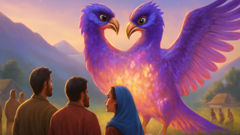
The villagers looked up. There, gliding through the pale dawn, was a creature unlike any they’d seen. The Shahrokh soared overhead, its twin heads crowned with crests of violet and gold, eyes gleaming with intelligence and kindness. Its wings spanned as wide as a house, trailing streams of iridescent light. The sight struck awe and fear into every heart; even the bravest were rooted to the earth, unable to speak. The Shahrokh circled once, twice, then settled gently in the field beyond the village. The grass seemed to spring anew beneath its talons, emerald and vibrant where moments before it had been parched.
Among the first to approach was Bahram, a humble shepherd known for his gentle manner and keen sense of justice. With hesitant steps, he crossed the meadow, his heart pounding like a drum. Close behind came Soraya, the village healer, whose wisdom and compassion were as renowned as her skill with herbs. Finally, Ardeshir—the nobleman who claimed most of Dastan’s land—strode forward, his eyes alight with a hunger that belied his courteous smile. Around them, villagers gathered, whispering prayers and old verses as they watched.
The Shahrokh regarded each with both heads, its gaze deep and searching. Then, it spoke—not with words, but with a song so rich and layered that each listener heard something different. To Bahram, it was a melody of hope, gentle as the breeze through grass. To Soraya, it carried ancient wisdom, full of questions and answers. To Ardeshir, it promised power and abundance, if only he could seize it. As the song faded, the Shahrokh’s heads bowed, and it extended one radiant feather to each of the three. The feathers shimmered with hidden promise: Bahram’s glowed green like new leaves, Soraya’s gleamed silver-white, and Ardeshir’s burned with deep crimson and gold.
Before anyone could speak, the Shahrokh took flight, disappearing into the mountains with a thunderous sweep of wings. The villagers stood in stunned silence. Bahram, Soraya, and Ardeshir looked at one another—each clutching their feather, each uncertain what it meant. Yet in that moment, the fate of Dastan began to turn.
The Gifts and Their Shadows
In the days that followed, Dastan changed. Where Bahram walked with his emerald feather, grass grew tall and sweet, drawing flocks of sheep and deer. Farmers came to him, marveling at how the earth seemed to heal beneath his presence. Bahram, modest and kind, shared his luck freely—never keeping fortune for himself, but ensuring every family had enough.

Soraya, too, found her life transformed. The silver-white feather she kept in her satchel pulsed with a gentle glow. When she brewed her medicines, herbs took on new potency, and her hands healed wounds that once would have meant death. She became a beacon of hope. Yet Soraya was wise; she knew that her feather was no mere charm, but a test. She taught those who came to her not just to seek cures, but to understand their bodies and spirits. She counseled patience and gratitude, reminding all that healing was a partnership between giver and receiver.
Ardeshir, however, saw his crimson-and-gold feather as proof of his destiny. He commanded his servants to plant more fields, expand his orchards, and build new storerooms for the harvest he believed would soon come. At first, fortune seemed to favor him: his pomegranates swelled larger than ever, and his wells ran clear even as others’ dried. Yet he grew possessive, forbidding his workers to share with neighboring villages and raising new walls around his estate. Whispers spread—of a nobleman grown cold and suspicious, of feasts held behind locked gates while others went hungry.
The village elders met beneath the old cypress to discuss the changes. They wondered if the Shahrokh’s gifts were blessings or burdens. Soraya warned them: ‘Fortune tests the heart. If we hoard it, we lose what matters most.’ Bahram nodded, offering to teach any who wished how to care for the renewed pastures. But Ardeshir refused, convinced that sharing would diminish his power.
One night, a violent storm swept through Dastan. Lightning struck Ardeshir’s orchard, setting the trees ablaze. The next morning, the crimson-and-gold feather was gone, reduced to ash. Fields that had flourished now lay scorched and bare. Meanwhile, Bahram’s meadows remained green, and Soraya’s medicines continued to heal. The villagers saw in this a lesson: fortune is not meant to be locked away. Ardeshir, humbled and alone, sought out Bahram and Soraya, asking for forgiveness and guidance.
Together, they journeyed to the sacred hill and called out to the Shahrokh, hoping for understanding.
The Song of Wisdom and Fortune
Beneath the cypress tree—old as memory and thick with the scent of rain—the three stood, calling out with words and hearts. Silence answered at first. Then the sky brightened; a cool breeze swirled petals around them. The Shahrokh appeared again, descending from the clouds with a grace that stilled every sound. Its two heads regarded Bahram and Soraya with warmth, Ardeshir with gentle reproach.
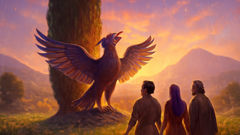
The bird’s song rang out, deeper and more intricate than before. This time, all three heard the same message: ‘True fortune is not in what you possess, but in how you give. Wisdom does not come from power, but from humility and care.’ The Shahrokh’s eyes lingered on Ardeshir as he bowed his head in shame, tears slipping down his cheeks. He offered what remained of his charred feather to Bahram and Soraya, asking them to help him make amends.
Moved by his sincerity, Bahram and Soraya joined hands with Ardeshir. Together, they pledged to use their gifts for the good of all. The Shahrokh nodded, its feathers shimmering brighter than ever. As it spread its wings, a gentle rain began to fall—soft and warm, nourishing every field and garden. The village rejoiced; old wounds healed, and new friendships blossomed. Bahram taught children to care for animals and land, Soraya shared her healing arts with neighbors far and wide, and Ardeshir opened his stores to all who needed them, becoming a leader respected not for his wealth, but for his kindness.
In the years that followed, Dastan flourished as never before. Each spring, villagers gathered on the sacred hill, offering thanks to the Shahrokh—not for riches or miracles, but for the wisdom to share what they had. Sometimes, on misty mornings or golden evenings, a great shadow would pass overhead. Those who looked up swore they saw two regal heads and wings bright as sunrise—a reminder that true happiness comes from unity, generosity, and understanding.
And so the legend of the Shahrokh endured, growing richer with every telling. The people of Dastan learned that the greatest gift was not the bird’s feather or its magic, but the wisdom it inspired in their hearts. Fortune, they realized, could be as fleeting as the wind or as lasting as a lesson learned. By choosing to give, to forgive, and to work together, they had shaped a destiny brighter than any myth.
Conclusion
The Shahrokh’s legend lingers in the gentle winds that rustle through Dastan’s orchards and the laughter echoing from its sunlit courtyards. Generations have passed since that miraculous spring, yet every child in the village grows up knowing the story—the promise that fortune, when shared freely and guided by wisdom, multiplies beyond imagination. Bahram’s meadows are now gardens for all; Soraya’s teachings are passed from healer to healer; Ardeshir’s descendants walk humbly among their neighbors. Each year, at the festival of renewal, the villagers leave garlands and offerings beneath the cypress tree, hoping the Shahrokh will bless them once again. But more than gold or abundance, they ask for unity, courage, and understanding—gifts far greater than any feather. As the sun sets behind distant mountains, some say you can hear a faint, harmonious song on the breeze: a reminder that happiness is not merely a gift to receive, but a light to be shared. The Shahrokh’s greatest blessing was never its magic or its mythic presence—it was the wisdom it left in every heart.

